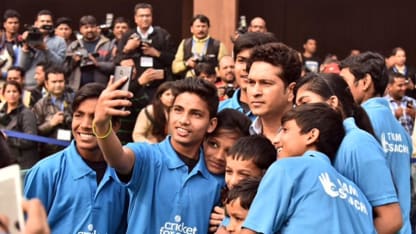ICC | About ICC
Cricket for Good

Sachin Tendulkar is a UNICEF Goodwill Ambassador
UNICEF
The International Cricket Council (ICC), the global governing body of cricket, announced a five-year Corporate Social Responsibility (CSR) partnership with the United Nations Children’s Fund (UNICEF) on 21 October 2015.
The collaboration reflects ICC’s commitment to the Spirit of Cricket, which is to use the popularity of the sport for social good. For UNICEF, the International Cricket Council is a powerful ally given its reach in the international cricket community across the globe. The partnership provides UNICEF a critical platform to reach millions of children, adolescents and their families and positively impact their lives.
ICC Chief Executive, David Richardson commented that investing in initiatives that will improve the health, education, nutrition, protection and sanitation of children is so important to the lives of us all and ICC is proud to work with UNICEF in bringing these projects to life. ICC and UNICEF together will engage the broader cricketing community in work to empower children and adolescents and will, in particular, during the many ICC Events over the next five years, develop and implement various community outreach programmes and initiatives in collaboration with coaches, cricketers and cricketing personalities.
UNICEF believes in incorporating the power and potential of sport into country programmes across the world to promote the healthy development of children and teach important life lessons such as respect, leadership, cooperation and equality. Major ICC events also provide opportunities to raise awareness on a range of socio-economic issues and support initiatives for children’s rights and wellbeing.
Tony Lake, UNICEF Executive Director remarked that UNICEF is delighted to unite with ICC to improve the lives of children. Through this partnership UNICEF aims to change the lives of millions of children across the globe. This partnership will support UNICEF in their quest to create a world fit for all children.
Team Swachh
ICC launched Cricket for Good & Team Swachh campaign in partnership with UNICEF and BCCI on 18 Jan 2016 in New Delhi, India.
Team Swachh is the first of a series of collaborations between the ICC and UNICEF under the aegis of Cricket for Good with the aim of leveraging the vast reach and power of cricket. This visionary collaboration aims to build a social movement for sanitation and toilet use, thereby leading to an open defecation-free India.
ICC Chief Executive, David Richardson committed to working with UNICEF on initiatives that will improve the health, education, nutrition, protection and sanitation of children.
In the build up to the ICC World Twenty20 India 2016, there was an eight host city tour that used exciting cricket-based sanitation and hygiene games to engage with school children. During the event itself, 16 teams participated in cricket coaching clinics for the disadvantaged children.
Cricket icon Sachin Tendulkar, a UNICEF Goodwill Ambassador, remarked, “Similarly, ending open defecation-achieving sanitation for all in India, takes a genuine team effort in which all relevant actors – from the Government of India to people practicing open defecation, from role models to international development partners - play together as one team.”
The Secretary of the Board of Control for Cricket in India (BCCI), Anurag Thakur, commented: “Team Swachhpresents a creative and collaborative platform to make the nationwide movement a resounding success. The ICC World Twenty20 India 2016 brought together the collective efforts of the BCCI, ICC and UNICEF towards the mission with the help of awareness programmes.
UNICEF Regional Director for South Asia, Karin Hulshof, said that UNICEF hopes to harness the reach and power of cricket, one of the world’s most popular sports, towards the most important cause of all: saving the lives and futures of children.
At the Launch, Sachin Tendulkar picked up the bat once again and played a game with children of a local non-governmental organization (NGO), Nine is Mine. The master batsman then took time to discuss sanitation with the kids, and shared ideas and thoughts on how they could spread the message of ending open defecation among their peers.